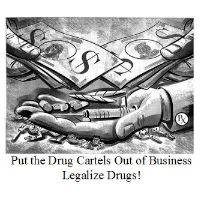Benefits of Drug Legalization May Outweigh Increase in Number of Drug Users

The chorus of official voices calling for an end to drug prohibition and its replacement with decriminalization or legalization grew by two last week with the release of expert reports by the Organization of American States (OAS) and the Canadian Drug Policy Coalition.
The OAS report, which includes a detailed overview of the economics of drug production, distribution and consumption in the Western hemisphere, revealed that the industry in North America is worth $140 billion of the annual $330 billion global illegal drug trade.
The analytical portion of the report indicates that the benefits of decriminalization or legalization would be greater than their costs, pointing out that the “available evidence suggests that reducing penalties for possession of small quantities has little effect on the number of users but retains the benefit of reducing judicial case loads and incarceration rates.” Legalization would have the added benefits of saving money on enforcement costs, reducing rates of disease and death associated with drug use, cutting violent crime, and causing a drop in corruption generally.
The only downside listed in the OAS report is greater rates of drug use, although the report concedes that “it is impossible to know” if usage would go up and simply asserts that “it is reasonable to assume that greater availability…would lead more people to use drugs.” One senses the heavy hand of U.S. representatives to the OAS here.
The Canadian report, issued by a group of Canadian drug policy experts at Simon Fraser University’s Centre for Applied Research in Mental Health and Addiction, recommends the dismantling of the drug war and the decriminalization of all drugs. Noting that even Conservative Canadian Prime Minister Stephen Harper has admitted that the drug war “is not working,” the report argues that it has been counterproductive: “Far from eliminating drug use and the illicit trade, prohibition has inadvertently fueled the development of the world’s largest illegal commodities market, estimated by the UN in 2005 at approximately $350 billion a year…and drugs are cheaper and more available than ever.”
Like the OAS report, the Canadian study also finds that the benefits of decriminalization outweigh the costs, and observed that countries that have decriminalized some or all drugs, like the Czech Republic and Portugal, have experienced the expected benefits, but drug use has not increased. In Portugal, which decriminalized all drugs in 2001, “decriminalization has had the effect of decreasing the numbers of people injecting drugs, decreasing the number of people using drugs problematically, and decreasing trends of drug use among 15 to 24 year olds,” according to the report.
-Matt Bewig
To Learn More:
OAS: Legalization Might Reduce North America's $140b Drug Problem (by Paul Bedard, Washington Examiner)
Canadian Drug Policy Experts Recommend Decriminalizing all Drugs (by Stephen C. Webster, Raw Story)
The Drug Problem in the Americas (Organization of American States General Secretariat) (pdf)
Getting to Tomorrow: A Report on Canadian Drug Policy (Canadian Drug Policy Coalition) (pdf)
Clarifying Federal Law on Marijuana…U.S. Can Insist that it is Illegal, but Can’t Force States to Enforce the Law (by Matt Bewig, AllGov)
- Top Stories
- Unusual News
- Where is the Money Going?
- Controversies
- U.S. and the World
- Appointments and Resignations
- Latest News
- Trump to Stop Deportations If…
- Trump Denounces World Series
- What If China Invaded the United States?
- Donald Trump Has a Mental Health Problem and It Has a Name
- Trump Goes on Renaming Frenzy






Comments